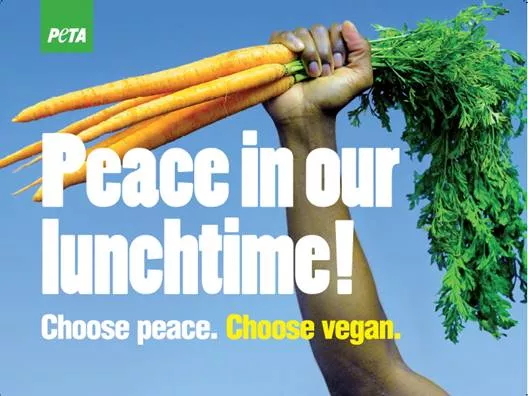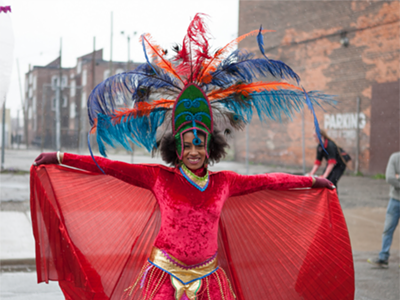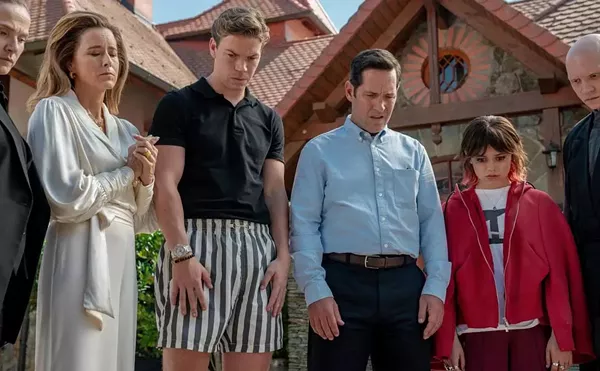
Audio By Carbonatix
[
{
"name": "GPT - Leaderboard - Inline - Content",
"component": "35519556",
"insertPoint": "5th",
"startingPoint": "3",
"requiredCountToDisplay": "3",
"maxInsertions": 100,
"adList": [
{
"adPreset": "LeaderboardInline"
}
]
}
]
On this sleepy Thursday afternoon, the biggest tempest in our media landscape seems to be about veganism, racism, and class. And it's a sort of "Tempest in a Tempeh-Pot."
Like many kerfuffles, it all seems to have started innocently enough. As part of an ongoing campaign against cruelty to animals, animal-rights group People for the Ethical Treatment of Animals (PETA) announced plans to put up some billboards in Detroit.
This is nothing new for PETA. Putting up billboards that provoke strong reactions seems to be one of the group’s favorite get-the-message-out strategies, and they know how to play the game expertly. Many of the more provocative billboards bearing PETA's messages become news stories in their own right, as locals react to the message. The good people at PETA must chuckle with satisfaction every time one of their billboards provokes a two-minute news segment, as that much screen time could costs thousands of dollars if bought in paid advertising.
Another PETA tactic is to key special media campaigns to specific news stories, as when they offered to pay Detroiters’ water bills for a month if they went vegan. That campaign ignited an unintended controversy, when one blogger sniped at PETA from its left flank, declaring, “Water is a human right. Period. Holding it out like a prize proves [PETA] doesn’t value human life.”
So when PETA decided to do outdoor ad buys in Detroit this month, you could have predicted another round of TV news segments, softball interviews, and the rumblings of media critics. The campaign was ostensibly related to FBI statistics that suggested Detroit is the most violent big U.S. city. The billboards showed an upraised fist clutching a bunch of carrots, with a message that declared, “Peace in our lunchtime! Choose peace. Choose vegan.”
In a press release related to the campaign, PETA President Ingrid Newkirk said, "Violence and cruelty to any living being beget more violence and cruelty, whereas compassion for animals who suffer and are killed for the table promotes understanding and kindness. PETA's message of peace encourages everyone to save lives, promote nonviolence, and make a difference every day simply by choosing vegan meals."
So far so good, right?
The statement from PETA went on to note that, “In addition to sparing the lives of more than 100 animals a year, people who go vegan reduce their risk of suffering from heart disease, diabetes, cancer, and obesity—an issue important to Detroit, which has been climbing up ‘Fattest Cities in America’ lists.”
And right there is where it might have ended, but for a piece in a local daily paper that interviewed Katerina Davidovich, a PETA campaign manager. The piece itself was a nice little chat with Davidovich, who presented comments connecting meat-eating with violence, and argued that animals are sentient creatures who shouldn’t be subjected to ownership, exploitation, and slaughter. The piece also clarified that PETA is not picking on Detroit. It was a short piece, but not a bad bit of journalism.
And it might have gone online without a whimper of protest — if somebody hadn’t given the piece a doozy of a click-bait headline: “PETA to Detroit: Stop eating animals. You're the most violent, fattest city in America”
Perhaps that headline was what activated Detroit’s own Sam Riddle. Alternatively, as a seasoned political operative, Riddle may have just smelled blood in the water, hoping to get his two minutes of screen time as well. Whatever the reason, after "rage-reading" the piece, Riddle leaped into action using his ultimate superpower: overstatement.
Speaking in his role as the political director for the Michigan National Action Network, Riddle characterized the PETA campaign as a “vegan attack on Detroit” and said PETA was “every bit as racist as KKK neo-nazis.”
Wait? Funding a billboard showing a fistful of carrots is “behaving like a racist hate group”?
Riddle explains: "Detroit may be America's fattest and most violent city but to attribute that to us not eating our veggies is racist BS because Detroit is also America's blackest, most segregated and poorest city.”
Now, we wouldn’t want to pick a fight with Sam Riddle, but perhaps he labors under a slight misunderstanding when he claims PETA believes non-vegan diets are the cause of Detroit’s obesity and violence.
But there’s more: "PETA compost is comprised of a displaced reality rooted in racist white privilege that would have us growing some damn carrots instead of growing jobs and good schools to combat crime and poverty born of wealth inequality and systemic racism that justifies corporate welfare before helping single mothers."
Wow! That is a smoking-hot compost pile of rhetoric that needs a turn or two. The main tension it presents is between urban agriculture and Detroit’s complicated and unequal socio-political landscape. Perhaps it’s worth pointing out that the two aren’t necessarily mutually exclusive. We would, but for one thing: Riddle is just getting warmed up, folks. That was just some fissures opening, but now he’s about to explode and shower the landscape with red-hot magma.
"That ignorant-ass billboard of PETA makes those arrogant jerkwaters every bit as racist as the KKK and neo-nazis," said Riddle. "We have gardens in Detroit because we can't afford PETA recommended tofu. If PETA wants Detroit to improve our diet; PETA must address the historic roots of why we eat like we eat including slavery on plantations run by PETA ancestors."
If it sounds over-the-top, it is. Of course, PETA has engaged in some similar flourishes down the years, as when group members bedecked themselves in Klan outfits to protest a California dog show in 2009. So there’s plenty of credit to go around when it comes to dramatic overstatement. That said, Riddle’s allegation that PETA members are descended from plantation owners probably does nobody any good. No matter who our ancestors are, can’t we all join the fight against the plantation mentality?
But regardless of some poor word choices, like any astute operative, Riddle understands the dynamic in play. PETA is a national organization with tens of millions of dollars to spend on media buys every year on its single issue: animal cruelty. When they try to piggyback that issue by using gritty Detroit news hooks, some people are going to be offended.
While Riddle’s meltdown was surprising, our most bitter laughter in this whole donnybrook was over remarks from PETA’s Davidovich: "It’s so easy to go vegan nowadays, especially if you’re living in a metropolitan city like Detroit.”
Really? We have to wonder how much time Davidovich has spent in Detroit to make such a statement, to rank it with other “metropolitan” cities. You’d need a lot of California Dreamin’ and a fully stocked “goodie bag” of Sour Diesel to see Detroit in that light.
Call us crazy, but we have yet to see a party store stocking tofu in the drink cooler, and we haven’t seen a single Tempeh Hut in all the years we’ve lived here. Yeah, it’s so easy to be vegan in Detroit — especially if you love Fritos.
Yes, many Detroiters have done a lot of good work promoting dietary education, food security, and self-determination in Detroit, but you wonder how connected somebody like Davidovich is to that struggle. The message that veganism promotes health should ring clear as a bell, but it won’t as long as you seem tone-deaf to the city’s huge class issues. You might as well bring in Michael Pollan to scold Detroiters that, as with the majority of Americans, “spending more for better food is less a matter of ability than priority.”
UPDATE, 2:30 p.m. Sept. 29 — This statement from PETA addresses Sam Riddle's remarks:
At PETA, we combat hate speech like this with pleas for compassion for each other — regardless of race, gender, religion, species, or any other prejudice — and for putting aside hateful words and mean-spiritedness. We live by the principle of nonviolence, and since our inception, we have opposed all discrimination — but sadly, some of those who appeal for understanding are not always understanding themselves. Many of us feel relatively powerless in the face of violence, and choosing vegan meals is one way that each of us can make the world a kinder and more peaceful place. The "Peace in Our Lunchtime" billboards will go up in cities across the country, starting with Detroit because of its struggle to end violence, something everyone can do at breakfast. Instead of slamming those who work for nonviolence in their own way and hurling an accusation of racism at them — without even knowing what race they are —wouldn't it be much better to embrace them as fellow activists?








